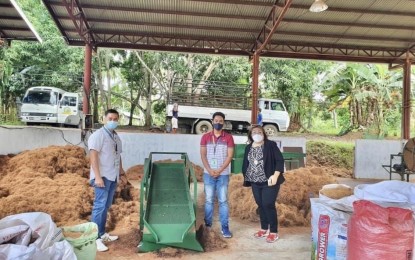
COCONUT HUB. Department of Agriculture-7 regional head Salvador Diputado (left) inspects on Tuesday (August 25, 2020) the PHP15-million Coconut Hub in Tuburan, Cebu. The project produces value-added products made from coconuts such as virgin coconut oil, coco sugar, ropes and decors as well as anti-soil erosion netting. (Photo courtesy of DA-7)
CEBU CITY – At least 1,500 coconut farmers will benefit from the PHP15-million Coconut Hub (Cocohub) of the Philippine Coconut Authority (PCA) and Lamac Multi-Purpose Cooperative (LPMC) in the northwestern Cebu town of Tuburan, the Department of Agriculture (DA) in Central Visayas said on Tuesday.
Lawyer Salvador Diputado, DA-7 regional chief, said the facility, which is a joint venture with the Land Bank of the Philippines (LBP) and the Department of Trade and Industry (DTI), serves as a production center for various value-added products made from coconut.
The project is in compliance with Agriculture Secretary William Dar’s directive to help coconut farmers during this time of coronavirus disease (Covid-19) pandemic.
OIC Mayor Aljun Diamante told the Philippine News Agency that 80 percent of the 54 barangays in Tuburan that have vast coconut plantations will benefit from the Coconut Hub.
“This project is the first and only in Cebu. Our end product will save the environment as the DPWH (Department of Public Works and Highways) signed a MOA (memorandum of agreement) with the contractors to use the coconut fiber as matting to government infrastructure projects in landslide-prone areas,” Diamante said.
Coconut fiber is an innovative alternative to the conventional engineering technologies in controlling and stopping soil erosions, protecting the community from hillside erosions and rehabilitation of degraded lands.
Diamante thanked DA for its generous help to the agricultural town.
He added that he still needs the help of DA in some other projects such as irrigation while expressing his support to the Gulayan sa Barangay program and other food production initiatives of the agency.
Diputado said the local government of Tuburan, LBP and DTI have a stake in the project so they can fully utilize the coconuts and assist coco farmers in marketing their goods, as well as provide employment to the residents.
The LPMC is one of Cebu’s most successful cooperatives, having been able to grow from being a small farmers group into an income-generating entity.
Apart from anti-soil erosion netting, the coconut farmers’ association in Tuburan produces and markets various products made from coconuts such as virgin coconut oil, coco sugar, ropes, decors and anti-coronavirus footbath matting.
But Diamante said the hub will also serve coconut farmers from neighboring towns in northern Cebu province. (PNA)
